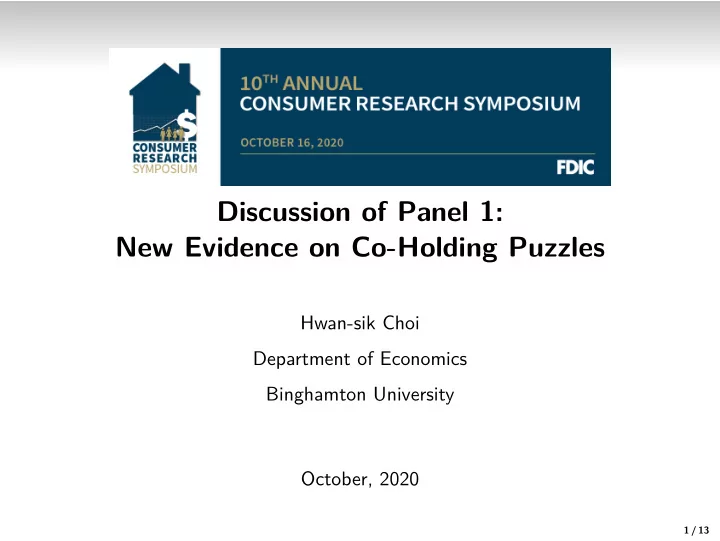

Discussion�of Panel�1:� New�Evidence�on�Co-Holding�Puzzles� Hwan-sik�Choi� Department�of�Economics� Binghamton�University� October,�2020� 1 / 13�
The�Outline� 1.� New�evidence�from�the two�papers.� 2.� Strength�and�weakness�of�bank�data.� 3.� What�might be�the�root�cause�of�co-holding?� 4.� Some�technical�comments�on�their�regressions.� 5.� My�wishlist�and�conjecture�of�the�root�cause.� 6.� Policy�discussion.� 2 / 13�
Two�Papers:� Findings�from�Objective�Bank�Data� The�Co-Holding�Puzzle:� New�Evidence�from Transaction-Level�Data� by John Gathergood and Arna Olafsson (2020)�- “PAPER�1”� 1.� Co-holding�is�not�severe�(annualized�median�cost�$12).� 2.� Hard�to�explain�co-holding�with�liquidity need,�credit�line�risk,� limited�attention,�shopper-saver�model.� 3.� Suggest�“mental�accounting”�or�self-control�as�a�factor.� Untangling�the�Credit�Card�Debt�Puzzle� by Erkki Vihriälä (2020)�- “PAPER 2 ”� 1.� Evidence of�uncooperative behavior�within�couples.� 2.� Anchoring�to�minimum�payments�(with�no�liquidity problem)� Frequent�min�payments ) more�co-holding� 3 / 13�
Main�Feature:� Objective�Bank�Data� Paper�1:� Financial�aggregator�app.� Daily�frequency,�transaction-level�information�from�Icelandic�banks.� Paper�2:� Monthly�data�from�a�large�Finnish�bank.� Includes�interest�rates,�housing�value,�etc.� Advantage:� •� Very�detailed�bank-held�asset/debt�information.� •� Objective�income�and�expenditure�measures.� Disadvantage:� Limited personal�data & non-bank�fnancials� •� Lack�of�ability�measures�such�as�education�level,�fnancial� knowledge,�cognitive�and noncognitive�abilities,�and� occupation.� No�psycho-social�measures.� ) Diÿcult�to�examine�(or�control�for)�ability and� psycho-social�factors.� •� Limited�information�on brokerage�accounts (stock, funds).� 4 / 13�
What�is�the�Root�Cause�of�Co-holding?� Personal�v.s.� situational�factors.� Ability (personal)� Situational� ! Liquidity needs� ! Self-control� ! Mental�accounting� ! Credit�line�risk� ?� ! Shopper-saver� ?� What�is�the�root�cause?� Root�cause�= Policy�target.� •� Lack�of�information.� •� Lack�of�comprehension�and�education.� •� Lack�of�income�or�liquidity.� •� Heuristics�and bounded�rationality?� 5 / 13�
Some�Technical�Comments�for�Paper�1� 1.� Likelihood of�starting�co-holding:� • Signifcance�levels�with 3 million�observations�may�not be�very� informative.� • Seemingly�small�economic�magnitude�of�the�e˙ect:� e.g. 0.23%�more� likely�to�start�co-holding�with�temptation�buying�(FE�model).� • Mostly�unexplained�variation:� R-squared�=�0.003.� • The�on-set�of�co-holding�is�a�transient�variable�whereas� income/expenditure is�relatively persistent.� The�change of� income/expenditure�may be�more�relevant�for�the�on-set.� • Simultaneity (endogeneity)�of�co-holding�and�income�(or� expenditure)?� What�if�cognitive�ability infuence both�co-holding�and� income?� 2.� Sample�selection�bias?� Households�with�“at�least�one�deposit� account�and�one�overdraft�line”� ) Opening�overdraft�lines�may be�an�endogenous�choice�(alluding� future�co-holding).� 6 / 13�
Some�Technical�Comments�for�Paper�1 (Cont.)� 3.� “Plausibly,�individuals�might prefer�to�assign�their�gambling�and temptation�purchases�to�a�separate�(mental)�account,�aside�from their�regular�expenditure.”� • Can�check�whether�gambling/temptation�buying occurs in the� overdraft�accounts?� • If�so,�gambling�is highly costly.� Is�this�consistent�with�the�dual-self� (shopper-saver�within an individual) model or is it�fnancial� ignorance?� 4.� What�determines�the�duration�of�co-holding�once�co-holding�starts� (individual�level�analysis)?� 7 / 13�
Some�Technical�Comments�for�Paper�2� 1.� Mortgage�o˙er�take-up�regression�for�intra-household�interaction:� • Low�deposit�or�high�debt�share� ⇒ high�mortgage�o˙er�take-up.� • Est.� sample�=�co-holding�households�only�(why?).� • What�if�the�e˙ects�are�similar�among�non-coholding�couples?� I suspect�that�non-coholders�are�also�uncooperative,�but�the�e˙ect� size may be larger for�co-holding�couples?� 2.� Household�switching�from�a�single�to�a�couple�(or�vice�versa)� ) Statistically�signifcant�(and�economically�large)�change�in� co-holding behavior?� Can�we�use�the�panel�nature�of�the�data�to�answer�this�question?� 8 / 13�
Some�Technical�Comments�for�Paper�2 (Cont.)� 3.� Is�mortgage�o˙er�take-up�rate�similar�for�non-coholders?� • If�so,�then�“debt�aversion”�may drive�their�mortgage�take-up� behaviors.� • However,�co-holders�seem�to�have�no�debt�aversion.� • Is�there�a�more�fundamental�psychological�factor�that�can�explain� both�debt�aversion�and�co-holding?� 4.� Intra-household�interaction�can�imply�either�(1)�cooperation�(2)� noncooperation�(shopper-saver model).� Study the�relationship of� cooperation/noncooperation�with�age-gap or�education/income�gap� within�the household.� 5.� Anchoring�- making�min�payment�and co-holding�are�simultaneously� (endogenously)�determined.� What�is�the�root�cause�of�the� anchoring?� Information�(education)�or�ability to�comprehend�the� fnancial�situation?� 9 / 13�
Current�Challenges�and�the�Wish�List� 1.� What�is�causing the�mental�accounting?� Information,�education,�or� cognitive�ability?� 2.� Use�of�bank data�is�not�suÿcient�to�separate�these�factors.� 3.� Ideally,�we�want�to�combine�bank�data,�survey�data,�and�government� databases.� 4.� Realistically, might try to�extract personal data in mortgage� applications�- education,�credit�score,�occupation,�income,�etc.� 10 / 13�
My�Conjecture� 1.� People�understand�that�co-holding�is�costly,�but�just�a�little.� 2.� From�the�co-holder’s perspective,�the�cost�seems�small�enough�to� not�care.� 3.� Mental�accounting,�self-control,�minimum�credit�card�payment.� “Slightly”�sub-optimal�choice�is�the�optimal�choice.� Mental�cost >�monetary�cost.� 4.� Root�cause:� Limited�cognitive�and�noncognitive�ability.� • Less�cognitive�e˙ort�and�heuristics�(Simon, Tversky,�and�Kahneman).� • Laziness�and�carelessness�(non-Conscientiousness)� Missing�deadlines.� Leaving�dirty dishes & trash.� Missing�classes.� Not�checking�billed�amounts.� Losing�umbrellas�multiple� Impulsive�shopping.� times�without�regrets.� 11 / 13�
Policy�Implications� 1.� Can we improve�mental�accounting by education?� 2.� Does�ineÿcient�mental�accounting�stem�from�misunderstanding,� lack�of�fnancial�literacy�or�more�fundamental�cognitive�or� noncognitive�ability?� 3.� Laziness�and�carelessness�(noncognitive�ability)?� ) Enforce�banks�to�notify�consumers.� Would�text�messages�help�nudging�to�pay o˙�overdraft�balances?� 12 / 13�
Policy�Implications�(Cont.)� Libertarian Paternalism� 4.� Free�overdraft protection�(ODP)�with�linked�accounts? Expensive�service�fee�=�$25-35�in�the�U.S.� • If not protected, need to pay $35 or more�(non-suÿcient�funds fee).� • Mental�accounting�may be�psychologically benefcial.� • Nonetheless,�co-holders�may still�demand�insurance�against�overdraft.� • Default�to�free�ODP program�with�opt-out�option� ⇒ Less proft for�banks, but�higher�consumer welfare.� 5.� Other policy�suggestions:� –� Fernandes�et�al.� (2014):� Just-in-time�education�(early�intervention� has�no�lasting�e˙ect).� –� Thaler�(NYT,�2013): Rules of thumb +�Easy�and�user-friendly� system�(easy�to�view�the�options�and�opt-out).� ⇒ Less�e˙ective�for�co-holding & impulsive�buyers� ⇒ Default�option� is better.� 13 / 13�
Recommend
More recommend